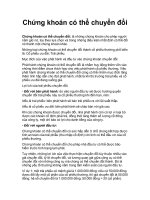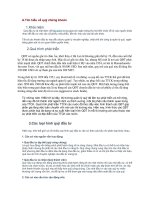Tài liệu ATAC International Business Development Strategy 2012/2013 docx
Bạn đang xem bản rút gọn của tài liệu. Xem và tải ngay bản đầy đủ của tài liệu tại đây (29.8 KB, 5 trang )
ATAC International Business Development Strategy 2012/2013
EXECUTIVE SUMMARY
Flight Training
This is Phase 6 of the Flight Training GOA supported ATAC International Business
Development Strategy (IBD) outreach to the International aviation community. The goal of
the ATAC IBD is to promote professional pilot training in Canada to foreign air operators,
civil aviation authorities and foreign students in India and Latin America. The current project
is focused on Brazil in “Latin America”. According to Boeing, Latin America will continue to
be a growth leader to the point that South America with be the 7
th
largest in its table of world
regional flows by 2029. Each cycle of the ATAC International project brings greater
refinement and precision through stronger ties with the authorities, deeper consultation and
feedback from the educationalists and air operators.
The Opportunity India group led by ATAC, has met numerous times in the last 2 years which
included two successful missions to India. ATAC and member companies met with the Joint
Direct General of Civil Aviation, 3 major Indian Air operators, educationalists, Indian Industry
Associations, Indian Banks and Indian students, and trade commissioners in February 2011.
The current phase of the Brazil project will follow up on findings from the 2011/2012
research paper commissioned by ATAC to identify market potential for international
development of Canadian pilot training in Brazil.
The Canadian Flight training sector has excess capacity which can easily handle the training
and upgrading of skills for the thousands of student pilot candidates on the Indian sub-
continent and in Latin America in need of professional pilot training. Canada has a robust
regulatory framework supporting the flight training industry and is highly regarded as one of
the best in the world by international airlines. However, we are not very good at marketing
and promoting our stellar reputation and safety in flight training to the international market.
The current capital upgrades in simulators and aircraft in Canadian Flight Schools are
attributed to the influx of International students. International student pilots are the number
one priority for the growth of the shrinking Canadian Flight School market. This project will
always be a work in progress and is based on the foundation established by our previous
mission. We will continue to build on our successes to establish and maintain the flow of
foreign students to Canada seeking the necessary skills to become professional commercial
pilots with Canadian commercial pilot licences ready to transition into the world’s airlines.
Maintenance, Repair and Overhaul (MRO)
The MRO sector has joined the ATAC GOA proposal for 2012/2013. The MRO market
represents $3.2 billion of business in Canada and supports 11,000 jobs. The ATAC
international outreach involves mining MRO business opportunities within South America,
Central America and Europe by actively participating in the MRO Americas and MRO
Europe shows. The shows identified will be attended by representatives from Latin America
and Europe and will facilitate interactions with key representatives. The recent addition of a
nationally recognized, experienced Canadian MRO resource to ATAC will provide the
internal in-depth support required to plan for the event and provide the necessary outreach
before, during and after the event.
SECTOR – ANALYSIS
Sector Overview
ATAC’s vision is to promote safe and reliable air transportation of people and goods to the
benefit of Canadian society with the mission statement “To support our members in their
pursuit of a safe, world-leading and sustainable Canadian air transport industry”. The pilot
training capabilities of our Canadian companies are competitive, second to none in terms of
quality and technology and are recognized worldwide by regulatory authorities. The goal of
the association with respect to pilot training is to increase the awareness of Canadian flight
training companies to the International marketplace making Canada the number one
destination for Professional Pilot Training applicants.
Flight Training
The Flight Training Unit (FTU) sector in Canada consists of 161 Flight Schools which has
been decreasing on a yearly basis since the 2002 high of 227 FTU operating certificates.
The Flight Training sector of the aviation industry is of critical importance to Canadian
aviation as it is at the grass roots, where ab initio students are trained with the competencies
needed to become professional working pilots for the aviation industry. Although the number
of flight schools is trending downwards the number of commercial pilot candidates has
stabilized and is trending upwards primarily due to the increase in foreign trained pilots in
Canada. About 40% of commercial licenses in Canada are obtained by foreign students and
that number is expected to continue to grow. Latin America and the Caribbean account for
10% of global air traffic with the largest increase in departures and a combined growth rate
of 13%.
ATAC’s FTU’s represent approximately 80% of all of the commercial flight training done in
Canada and are represented in all of the provinces from coast to coast. These schools
include the top aviation colleges and largest capacity flight schools in the country with the
largest fleet of aircraft and most advanced simulation. These schools are notable for having
a full range of capabilities to train pilots from ab initio to advanced pilot training. In Canada
the diverse geography and diverse weather conditions provide for real world flying situations
which are not readily available in other countries. Our safety record is one of the best in the
world and our piloting skills are second to none.
Maintenance Repair and Overhaul (MRO)
The Maintenance, Repair and Overhaul (MRO) sector represents 13.85 % of the $23.2
billion revenue generated by the Canadian Aerospace Industry, as reported by the
Aerospace Industries Association of Canada from their 2010 statistical highlights.
The recent addition to ATAC of a senior Executive Vice President (VP) with extensive MRO
experience to support this initiative. ATAC’s new VP created the Canadian MRO Alliance
and the corresponding international marketing efforts supporting the key Canadian industry
for over 10 years. He has provided internal in-depth support not existing elsewhere in
Canadian associations. This new resource will enable the required planning to ensure the
success of the event and provide the necessary follow up and outreach before, during and
after the event. This new resource with appropriate focus on the MRO subsector will
promote the following key advantages of the Canadian MRO: highly trained and competent
personnel, world recognized aircraft maintenance engineer license system, Canadian
Council for Aviation & Aerospace standards, state of the art facilities, capacity for all sizes
and types of aircraft, and full services MRO firms capable of meeting the full range of the
customers MRO needs. ATAC’s MRO resource has the required background to provide the
needed focus on facilitating and harmonizing regulations between Transport Canada (TC),
the Federal Aviation Administration (FAA) and the European Aviation Safety Agency
(EASA). In the global aviation industry, harmonizing regulations is an enabler for Canadian
MRO companies to service foreign registered aircraft.
TARGET MARKET
Flight Training - India
India has been targeted for the last 2 years of this project due to its explosive growth in the
airline sector and its significant commercial aircraft purchases. Case in point is a recent
announcement that India has made aviation history when low cost carrier IndiGo ordered180
Airbus A-320s with a list price of almost $16 billion (Rs 72,000 crore) to be delivered
between 2016 and 2025. This is the single largest order ever in terms of number of aircraft
by an airline globally. The immediate demand for aviation professionals in the Indian market
will be 5,000 across the subsectors in aviation.
Forecasts predict that India will need 1,000 new pilots every year over the next decade. India
has limited training capacity in country. Canada has the capacity to double/triple training
among ATAC member operators to the value of $30M per year. The Indian Directorate
General of Civil Aviation mandated Indian Air Operators to hire Indian pilots instead of
expatriate pilots by 2010. Currently information from India has indicated that 3,000
commercial pilot licences require upgrades to be considered for future hiring by air
operators.
Flight Training – Brazil
Brazil is the new target for this phase of the proposal supported by the recent market
analysis identifying a strong demand for pilot training. The Brazilian government continues to
invest in airport upgrades to support increased aircraft fleets needed to service
improvements in domestic air travel. Brazilian aircraft manufacturer Embraer is expecting a
4.9% growth introducing 3,100 new jets in the 30 to 90 seat sector. This forecast contrasts
Boeings recently issued market forecast that predicted demand for 1,980 regional jets over
the same 20 year period. Embraer is also financially supported by the Brazilian government
through subsidies.
Association members were consulted about this market and we estimate approximately $18
million dollars will be generated for flight training in Canada. The market analysis for Brazil
Flight Training is the foundation the project and better defines the market potential. We
continue to target students who are aspiring to become professional pilots but do not have
access to the training within their own country.
Western Hemisphere and Europe (MRO)
The target market for Canadian MRO companies in the Western Hemisphere is primarily
focused on the US however most new opportunities exist in Central and South America
supporting the explosive forecast growth of regional aircraft in Latin America. The second
area of interest and next most important growth area accessible to Canadian MRO is the
European aviation community. These markets have been identified by ATAC’s MRO
specialist Les Aalders as the target markets for the 2012/2013 GOA resources.
STRATEGIC PRIORITIES
A multipronged strategy across several initiatives ensures that targeted numbers for
International outreach are achieved within a shorter period of time, however to maintain
these numbers all participating member companies will have to commit for a sustained
marketing presence in the international markets for at least 3-5 years. To further support the
International program, Brazil is the focus of the current market analysis and research paper.
Future missions in the next fiscal year will be focused on Brazil air operators, civil aviation
authorities and student recruitment, to establish the links needed to promote professional
pilot training in Canada to the Brazilian marketplace.
Flight Training
While support in the research paper to identify the market potential for commercial pilot
training is strong, there are no easily identifiable geographic areas within the country which
have a concentrated pool of potential student pilots. The strategy for future missions to Brazil
will address the limited number of potential applicant pools in any one city. It is
recommended that missions/delegates to Brazil consist of several groups of 3-5 members at
any one point in time, visiting key cities in Brazil. Each group will visit a particular geographic
region so that there is no overlap between the groups while at the same time there is a
spread of awareness of Canadian flight training across Brazil. A delegation consisting of
more than this recommended number will result in a situation where it will be difficult to
identify numbers to satisfy all participating members from any one city.
Unless a Brazilian partner demonstrates the capacity to provide student traffic in volumes, it
is recommended that no more than 3-4 ATAC member companies sign up with any one local
recruitment agency.
The following are the objectives to promote the strategy.
1. Develop and maintain a collaborative network of agents, counsellors and trade
commissioners in Brazil.
a. The network will consists of 25 - 40 professionals, agencies/individuals/academics/
counsellors/ alumni/flight schools across Brazil.
2. Agencies will be provided training by in-country representatives on behalf of ATAC
member schools on programs, admission process, application forwarding etc. ATAC will
provide all material and process support for the training.
3. ATAC companies will participate in select high profile events in Brazil to increase the
profile of Canadian pilot training.
4. Ensure member schools’ internal capacity can accommodate numbers (enquiries,
applications and registrations) from Brazil so that service quality is assured as numbers
increase.
5. Identify and train an ATAC in-country counsellor (part time) who will maintain existing
relationships, develop new relationships, manage online presence and conduct
education and visa counselling for the ATAC members.
Maintenance Repair and Overhaul (MRO)
1. The MRO focus will be supported by extensive consultations with the DFAIT trade
commissioners representing Europe and Latin America identifying the most promising
linkages with foreign companies requiring the expertise and services from Canadian
MRO firms.
2. The project will focus on promoting Canadian MRO service centres who have the
capacity to handle narrow body, wide body, commuter, regional jets, military, business
and specialty aircraft as well as engines and components from these types of aircraft.
The Canadian MRO capability and capacity is a competitive advantage in servicing
foreign companies and governments operating mixed fleets of aircraft. Total MRO
services provide cost effective, one stop shopping for international operators lacking, in
country capacity to provide MRO services to meet their operational requirements.
3. Communication and international marketing of Canadian MRO advantages will be the
focus of the MRO initiative of the GOA 2012/2013 proposal.
MEASUREMENT OF RESULTS
Flight Training
Success for the program will be the delivery of approximately $18 million in flight training
year over year once we have established the linkages with the educationalists who recruit
students and the airlines who receive pilot candidates from Canada with the skill knowledge
and attitudes that are employable at minimum transition costs to Brazilian operators. It is
pertinent to point out that activities conducted for student benefit this year will have a roll-
over effect and will continue to produce results over the next couple of years, until Brazil
builds its own in-country capacity.
Maintenance Repair and Overhaul (MRO)
Success will be determined by the revenue growth of Canadian companies working with
operators in the Western Hemisphere and Europe. New markets where Canadian MRO has
not done business in the past will be a testament to the success of the International outreach
in the MRO sector of Canadian aviation. The ability of Canadian companies to service new
markets is second to none and will have long term financial benefits to the viability of MRO in
Canada.
January 10, 2012









